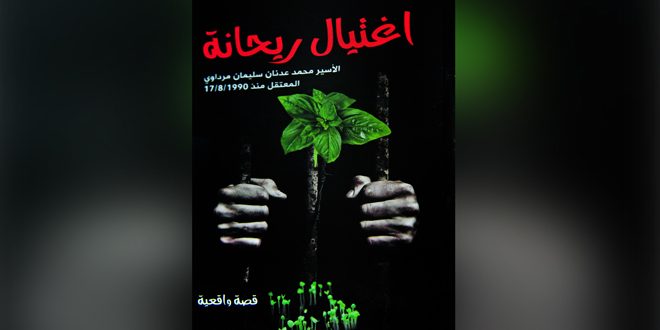A Palestinian Prisoner confirms through his novel that Damascus is the only outlet to convey his sufferings
“How are they still alive? Didn’t we kill them yesterday?” A phrase that perhaps sums up the daily battle of captivity that the prisoners of the Palestinian resistance wage in the prisons of the Zionist occupation. Palestinian prisoner Muhammad Mardawi in his novel “The Assassination of Rehana” confirmed that Damascus once again is his only and last outlet to convey his suffering and his colleagues’ to the world.
The prisoner Mardawi is considered one of the deans of prisoners in the prisons of the Zionist entity, and today marks 32 years since his arrest by the occupation forces on charges of resisting. He chose Syria to publish his novel “The Assassination of Rehana”, which embodies the will of a prisoner that is impossible to be broken and the embrace of the Syrians.
It embodies love for a holy land, a just cause, a rooted belief, and a message from behind the bars of the occupation that there is a voice of truth and a will for life stemming from the land of Syria.
The prisoner Mardawi chose the “New Dilmun” house in Damascus to publish his novel through it, and the people in charge of this house bear the responsibility of conveying the message of the suffering of the prisoners in the occupation prisons through literature to the free people of the world. The most excellent translators translated this novel into the English, French and Persian languages.
This novel, which is classified as a realistic story, talks about what is going on in the occupation prisons such as the resistance of the prisoners and their attempt to plant hope for life, even if it was through a small seedling of the basil plant that Palestine is famous for.
The novel began when Muhammad thought of a way to bring life and hope into the hearts of the captives. The prisoners thought of a plant that embodies the smell of land, home and history, so it was basil.
The name of the town of Rehana is derived from the basil plant. That small town near Haifa was destroyed by the Zionist gangs in 1948 and its people were displaced from it and a settlement for strangers coming from overseas was built on its ruins to inhabit it instead of its original peasant sons.
That basil plant in the novel is a symbol of the resurrection of the prisoners from the slow death creeping towards them to a new resurrection that takes them to a beautiful life awaiting them.
After the captives chose their plant, they moved on to implement their plan of securing the basil seed and how it could be smuggled into the detention camp so that one of the people could bring the seed. But they still have another, more difficult task in front of them which is to secure soil for planting.
The prisoners worked to collect the dust stuck in the onions, potatoes and garlic, which the jailors brought to them in the cells. They worked to collect the dust of the basil one by one, and they preserved it, because they are the ones who know the value of the land and its soil.
The dream of the prisoners continued until the secret of the prisoners was discovered, and the soldiers worked to uproot and crush the basil with their feet, looking at them and saying : How are they still alive ? Didn’t we kill them yesterday?
This novel is short , but the size of an epic in meaning , was gifted by the captive Mardawi to the soul of his mother, who had the greatest impact in shaping his consciousness on the path of struggle, to the soul of the martyr Imad Mughniyeh, to his cellmate, the martyr Samir Kuntar, to the martyrs of the Syrian Arab Army, and to all the martyrs who resisted and sacrificed for the liberation of Palestine.
It is noteworthy that the 178-page novel is published on the occasion of the anniversary of the arrest of the prisoner Muhammad Mardawi on August 17, 1990. It was presented by the Syrian writer and media figure, Nahla Al-Susu, and was drafted and revised by the” son “of south Lebanon, Muhammad Lama.
Inas Abdulkareem

